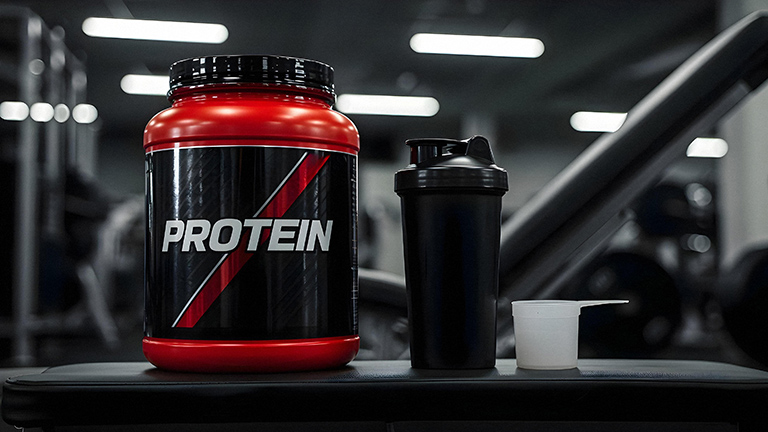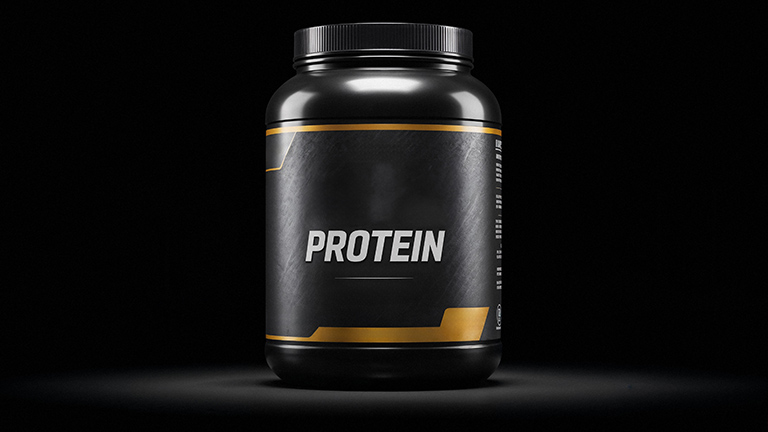Protein Powder for Teens Fitness: During adolescence, the body undergoes rapid growth, hormonal changes, and an increased need for nutrients. Many teens engaged in sports, gym workouts, or fitness routines often struggle to meet their heightened protein requirements through diet alone. Protein powders have become a popular solution to support muscle development, recovery, and overall health.
Parents and fitness trainers often recommend protein supplements to teens who are actively training. However, understanding the role of protein and the safest options for teenagers is crucial. Protein powders should never replace whole foods but can serve as a convenient addition when balanced with proper nutrition.
Role of Protein in Teen Growth and Fitness
Protein is a fundamental macro nutrient required for tissue repair, muscle building, hormone production, and enzyme function. For teens, consuming adequate protein supports:
- Muscle development during puberty
- Faster recovery after workouts
- Maintenance of healthy skin, hair, and nails
- Optimal bone density and growth
Protein also plays a vital role in energy management, helping teens sustain physical activity and avoid fatigue. Selecting the right protein source ensures teens benefit without negative effects on growth or digestion.
Understanding Teen Nutritional Needs
Daily Protein Requirements for Adolescents
The protein requirement for teens varies based on age, weight, activity level, and growth stage. On average, a teen requires 0.85 to 1.1 grams of protein per kilogram of body weight. Active teens or those participating in resistance training may need up to 1.2–1.5 grams per kilogram to support muscle growth and recovery.
Meeting this requirement through whole foods is ideal, but protein powders provide a convenient alternative for teens who struggle to consume enough protein through meals alone.
[INSERT_ELEMENTOR id=”5108″]
How Nutrition Impacts Muscle Development
Muscle growth depends not only on protein intake but also on overall nutrition. Carbohydrates provide energy for workouts, fats support hormone production, and micro nutrients like calcium, vitamin D, and magnesium contribute to bone and muscle health. Protein powders complement these nutrients but cannot replace a balanced diet.
A diet rich in lean meats, dairy, legumes, whole grains, fruits, and vegetables ensures teens have the foundation for healthy muscle development. Protein supplements should only enhance this foundation, not substitute it.
The Importance of Balanced Diet Over Supplements
Relying solely on protein powder can lead to nutrient deficiencies and digestive issues. Whole foods provide fiber, vitamins, and minerals essential for growth and overall health. Protein powders should be integrated with regular meals, rather than consumed in isolation, to ensure teens meet both their macro nutrient and micro nutrient needs.
Types of Protein Powders Suitable for Teens
Casein Protein: Slow-Release Benefits
Casein protein is another milk-derived protein but digests slowly, providing a steady supply of amino acids over several hours. This slow-release makes it ideal for nighttime recovery or as a supplement between meals. Teens who require prolonged muscle nourishment benefit from including casein in their routine.
Plant-Based Protein Options: Pea, Soy, & Rice
Plant-based protein powders are suitable for teens with lactose intolerance, dairy allergies, or dietary preferences such as veganism. Popular plant-based options include pea protein, soy protein, and rice protein. These provide a complete amino acid profile when combined correctly, supporting muscle growth and recovery.
Plant-based powders are generally easier on digestion and offer additional nutrients, such as fiber, iron, and antioxidants. They are increasingly popular among teens seeking a natural and sustainable approach to fitness supplementation.
Protein Powder vs Whole Food Protein Sources
While protein powders are convenient, whole foods remain the optimal source of nutrition. Foods like eggs, chicken, fish, beans, lentils, dairy, nuts, and seeds provide protein along with essential vitamins and minerals. Protein powders should be considered supplementary, especially for active teens or those struggling to meet daily protein requirements.
Choosing the Right Protein Powder
Factors to Consider Before Buying
Parents and teens should evaluate several factors when choosing a protein powder:
- Age appropriateness and safety for adolescents
- Protein content per serving
- Source of protein (whey, casein, plant-based)
- Added sugars, artificial flavours, and fillers
- Brand reputation and third-party testing
Selecting a high-quality protein powder ensures that teens receive the intended benefits without compromising their health.
Safe Brands for Teen Fitness
Reputable brands often provide products specifically formulated for teenagers. These are usually lower in protein concentration per serving, contain no harmful additives, and are tested for contaminants. Parents should prioritise products with transparent labelling and certifications.
Reading Labels and Understanding Ingredients
Understanding the nutrition label is critical. Teens and parents should check for protein content, calories, sugar, and fat per serving. Ingredients like whey protein isolate or hydrolysate are generally higher quality than protein blends with added fillers. Avoid powders with excessive sweeteners, artificial colours, or stimulants.
How to Use Protein Powder Safely
Proper Dosage Guidelines for Teens
Teens should consume protein powder in moderation, typically 20–30 grams per serving, depending on body weight and activity level. It’s best to spread protein intake throughout the day rather than taking large amounts at once. Over consumption can strain the kidneys and digestive system. Always pair protein supplements with a balanced diet of whole foods and consult a healthcare professional to ensure safe and effective use.
Pre and Post-Workout Protein Timing
Consuming protein at the right times enhances muscle growth and recovery for teens engaged in fitness or sports. A pre-workout protein shake, combined with carbohydrates, provides energy and reduces muscle breakdown during exercise. Post-workout protein, ideally within 30–60 minutes, supplies essential amino acids to repair muscles and promote lean growth. While timing can optimise results, total daily protein intake matters most. Teens should integrate protein shakes with balanced meals, ensuring they meet overall nutritional needs without over-relying on supplements. Proper timing supports recovery, energy, and consistent performance.
Mixing Protein Powder with Foods and Shakes
Protein powders are versatile and can be incorporated into a variety of foods and beverages to enhance teen nutrition. They can be blended with milk, water, smoothies, yogurt, oatmeal, or even baked goods like pancakes and muffins. Combining protein powder with fruits, vegetables, or natural sweeteners improves taste while adding vitamins, minerals, and fiber. Teens should avoid using protein powders as complete meal replacements; instead, they should complement balanced meals. Creative mixing not only makes protein intake enjoyable but also supports consistent consumption, aiding muscle growth, recovery, and overall fitness.
Benefits of Protein Powder for Teen Fitness
Muscle Growth and Strength
Protein plays a critical role in supporting muscle growth and strength in teens engaged in sports or fitness activities. Adequate protein intake provides the essential amino acids required for muscle repair, tissue development, and lean mass gain. When combined with resistance training or strength exercises, protein powders help optimise muscle synthesis, reduce fatigue, and enhance performance. For teens, maintaining consistent protein intake through a combination of whole foods and supplements ensures steady progress in muscle development while supporting healthy growth and overall physical fitness.
Improved Recovery After Workouts
Protein powder supports faster recovery after intense workouts by supplying essential amino acids needed to repair and rebuild muscle tissue. For active teens, post-exercise protein intake reduces soreness, minimises muscle fatigue, and helps maintain consistent training performance. Combining protein shakes with carbohydrates after exercise further enhances muscle glycogen replenishment and energy restoration. When used alongside a balanced diet, protein supplementation ensures that teens recover efficiently, stay energised, and continue progressing in strength, endurance, and overall fitness without compromising their growth or health.
Weight Management and Energy Boost
Adequate protein intake helps teens maintain a healthy weight and supports sustained energy levels throughout the day. Protein promotes satiety, reducing unhealthy snacking and overeating, while providing the fuel needed for physical activity and sports performance. When combined with a balanced diet and regular exercise, protein powders can help manage body composition by supporting lean muscle growth and preventing excess fat gain. For active teens, incorporating protein shakes strategically ensures consistent energy, improved focus, and better overall fitness results without compromising growth or health.
Risks and Precautions
Over Consumption and Health Risks
Consuming too much protein can strain teens’ kidneys, increase dehydration risk, and cause digestive issues like bloating or constipation. Excess protein does not accelerate muscle growth and may lead to fat storage or nutrient imbalances. Teens should follow recommended guidelines, spreading protein intake across meals, and combine supplements with whole foods to ensure safe, effective use while supporting healthy growth and fitness.
Allergies and Digestive Issues
Some teens may experience allergies or digestive discomfort from protein powders, especially those containing whey, casein, or soy. Lactose intolerance can cause bloating, gas, or diarrhea, while certain plant-based proteins may trigger sensitivities in some individuals. Choosing protein powders with clean, allergen-free ingredients or lactose-free whey isolates can reduce these risks. Monitoring for any adverse reactions and gradually introducing supplements helps ensure teens safely benefit from protein intake without compromising digestion or overall health.
When to Consult a Healthcare Professional
Before introducing protein supplements, teens should consult a healthcare professional or registered dietitian. This ensures the chosen protein type, dosage, and timing align with their age, body weight, activity level, and growth needs. Consulting experts is especially important for teens with pre-existing health conditions, allergies, or digestive sensitivities. Professional guidance helps prevent over consumption, nutrient imbalances, and potential side effects, ensuring safe and effective use of protein powders as part of a balanced diet and fitness routine.
Top 5 Recommended Protein Powder for Teens Fitness
Certainly! Here are five top-rated protein powders suitable for teens, each catering to different dietary preferences and needs. These selections are based on expert reviews and product quality, ensuring they meet the nutritional requirements of growing adolescents.
1. Transparent Labs 100% Grass-Fed Whey Isolate
Transparent Labs offers a high-quality whey protein isolate sourced from grass-fed cows. Each serving provides 28 grams of protein with minimal lactose, making it suitable for teens without dairy allergies. The product is free from artificial ingredients, ensuring a clean supplement option. Transparent Labs
2. Legion Whey+
Legion Whey+ is known for its clean ingredients and high protein content. It contains 22 grams of protein per serving and is sweetened naturally with stevia. This product is ideal for teens seeking a supplement without artificial additives.
3. Sports Research Whey Isolate
This whey protein isolate offers 25 grams of protein per serving and is praised for its taste and mix ability. It’s a great option for teens looking to support their fitness goals with a reliable protein source.
4. Nutricost Whey Protein Concentrate
Nutricost provides a budget-friendly whey protein concentrate with 25 grams of protein per serving. It’s a suitable choice for teens seeking an affordable yet quality protein supplement. Garage Gym Reviews
5. ALOHA Organic Plant-Based Protein
For teens following a plant-based diet, ALOHA offers an organic protein powder with 18 grams of protein per serving. It’s made from pea, pumpkin seed, and brown rice proteins, providing a clean and digestible option free from dairy and soy. ALOHA
Note: Before introducing any supplement into a teen’s diet, it’s essential to consult with a healthcare professional to ensure it’s appropriate for their individual health needs and dietary requirements.
| Product | Protein per Serving | Type | Flavour Options | Price Range | Special Notes | Link |
| Transparent Labs 100% Grass-Fed Whey Isolate | 28g | Whey Isolate | Vanilla, Chocolate | $$$ | Minimal lactose, clean ingredients, teen-friendly | Link |
| Legion Whey+ | 22g | Whey Protein | Chocolate, Vanilla | $$ | Sweetened with stevia, no artificial additives | Link |
| Sports Research Whey Isolate | 25g | Whey Isolate | Vanilla, Chocolate, Unflavoured | $$ | High mix-ability and taste, supports fitness goals | Link |
| Nutricost Whey Protein Concentrate | 25g | Whey Concentrate | Chocolate, Vanilla | $ | Budget-friendly, quality protein source | Link |
| ALOHA Organic Plant-Based Protein | 18g | Plant-Based | Chocolate, Vanilla | $$ | Vegan-friendly, made from pea, pumpkin seed, brown rice | Link |
Expert Opinion in Protein Powder for Teens Fitness
Nutritionists, paediatricians, and fitness experts generally agree that protein is essential for teenage growth, muscle development, and overall health, but they emphasise moderation and proper guidance when using supplements.
Dr. Laura Schmidt, a registered dietitian specialising in adolescent nutrition, states, “Protein powders can be beneficial for teens who are active in sports or resistance training, especially if they struggle to meet their protein needs through diet alone. However, whole foods should always be the primary source of protein. Supplements are just that—supplements, not replacements for balanced meals.”
Fitness trainer and youth conditioning coach Michael Reynolds adds, “Teens who engage in strength training or endurance sports often require slightly higher protein intake than their peers. High-quality whey or plant-based protein powders, used in recommended doses, can improve recovery and support muscle growth without any negative impact on long-term development.”
The consensus among experts is clear: protein powders are safe for teens when chosen wisely and used responsibly. Key considerations include selecting reputable brands, avoiding products with excessive sugars or artificial additives, and consulting a healthcare professional to determine the correct dosage based on age, weight, and activity level.
In summary, experts encourage the use of protein supplements as a convenient and safe tool to help active teens meet their fitness goals while emphasising the irreplaceable value of whole-food nutrition.
FAQs About Protein Powder for Teens Fitness
Can protein powder stunt growth?
No, protein powder does not stunt growth. Growth depends on genetics, nutrition, sleep, and overall health. Excess protein, however, should be avoided to prevent kidney strain.
How much protein do teens really need?
Active teens need approximately 1.0–1.5 grams per kilogram of body weight. Most can meet this requirement through a combination of meals and supplements.
Are plant-based proteins effective for muscle building?
Yes, when consumed in sufficient quantities and with a balanced amino acid profile, plant-based proteins are effective for muscle growth and recovery.
Conclusion: Protein Powder for Teens Fitness
Protein powder can be a valuable supplement for teens who are actively engaged in fitness, sports, or strength training, helping to support muscle growth, recovery, and overall health. When used correctly, it complements a balanced diet that includes whole foods, vitamins, and minerals essential for adolescent development.
Safety and moderation are key. Teens should choose high-quality protein powders, preferably those designed for adolescents or free from artificial additives and excess sugar. Plant-based options offer a great alternative for those with dietary restrictions, while whey and casein proteins remain effective for supporting muscle synthesis.
Parents and teens should always consult a healthcare professional or registered dietitian before incorporating protein supplements, ensuring that the dosage aligns with individual nutritional needs. By combining proper nutrition, consistent exercise, and safe protein supplementation, teens can achieve their fitness goals while supporting healthy growth and development.
Ultimately, protein powder for teens is not a replacement for real food but a convenient tool to help meet protein requirements, enhance performance, and maintain energy levels, laying a strong foundation for lifelong fitness and health.



